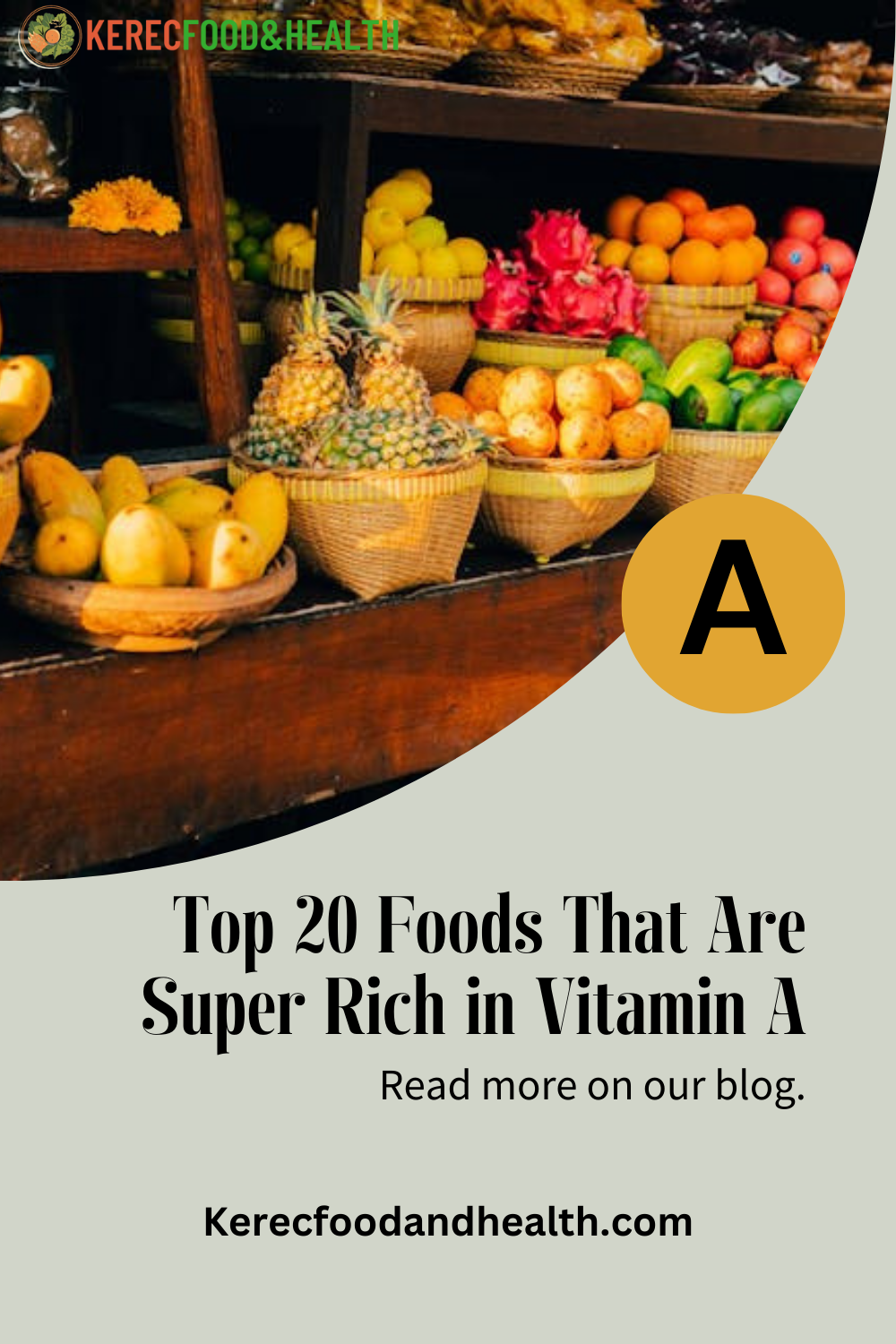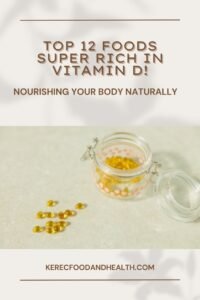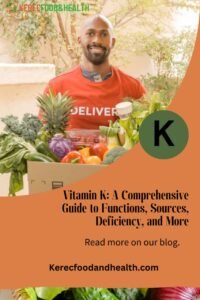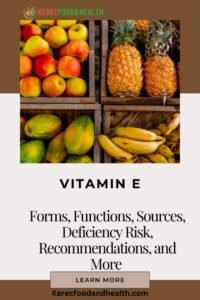Are you looking to boost your intake of vitamin A? Vitamin A, also known as retinol, is an essential nutrient for maintaining overall health. This essential nutrient plays a critical role in maintaining good vision, strengthening the immune system, promoting healthy skin, supporting cell growth, and aiding in the growth and development of the body. This essential vitamin is known for its powerful antioxidant properties, protecting our cells from damage caused by free radicals and is beneficial for maintaining healthy skin, promoting good vision, and supporting a robust immune system. Since our bodies can’t produce vitamin A on their own, we need to get it through our diet. Fortunately, a wide variety of foods, from colorful vegetables to rich animal sources, are packed with this essential vitamin. So, let’s dive right in and explore the top 20 foods that are super rich in vitamin A (retinol)!
1. Beef Liver
If you’re a meat lover, then beef liver is an excellent source of vitamin A for you. Liver is also rich in iron, zinc, and other B vitamins, making it a highly nutritious food.
How to Enjoy: Try liver in small amounts by adding it to stews, pâtés, or homemade meat sauces for a nutrient-dense boost.
It’s one of the most concentrated sources of this nutrient, with just 3 ounces providing over 600% of the daily recommended intake.
2. Cod Liver Oil
While not as commonly consumed as other sources, cod liver oil is an incredibly rich and potent source of vitamin A, along with omega-3 fatty acids, which offer a plethora of health benefits. It contains high levels of retinol, the active form of vitamin A, making it particularly beneficial for maintaining healthy vision. However, due to its concentrated nature, cod liver oil should be consumed in moderation and as per the recommended dosage.
One tablespoon of cod liver oil can provide 433% of the recommended daily intake of vitamin A for adults, depending on the brand and how it’s processed.
3. Carrots
Carrots are undoubtedly one of the most popular sources of retinol. These crunchy, bright orange root vegetables are not only delicious but also rich in beta-carotene, a precursor of vitamin A. Beta-carotene when converted into vitamin A in the body, supports eye health and maintaining healthy skin cells, prevent against night vision and age-related macular degeneration. Not only are they good for your eyes, but they also make a perfect snack when paired with hummus or added to salads and stir-fries.
How to Enjoy: Snack on them raw, shred them into salads, or roast for a flavorful side dish.
One cup of chopped carrots provides about 428% of the daily recommended intake of vitamin A.
4. Sweet Potatoes
Sweet potatoes are a superfood when it comes to vitamin A. These starchy yet nutritious tubers are loaded with beta-carotene, providing a significant amount of retinol, making them an excellent choice for promoting skin health and immune function. These root vegetables are also an excellent source of fiber, potassium, and other essential nutrients. They can be baked, roasted, mashed, or even made into fries for a healthy and delicious side dish.
How to Enjoy: Roast or mash them, or add them to soups for a naturally sweet and nutritious treat.
Just one medium-sized sweet potato contains over 400% of the recommended daily intake of this vitamin.
5. Spinach
Adding spinach to your diet is an excellent way to boost your vitamin A intake. This leafy green is loaded with nutrients such as iron, magnesium, and, of course, retinol. Packed with essential nutrients, including beta-carotene, spinach plays a crucial role in maintaining healthy eyes and supporting the immune system. Spinach is incredibly versatile, and it can be added to smoothies, omelets, soups, or enjoyed as a side dish. Therefore, incorporating spinach into your diet can significantly improve your retinol intake.
How to Enjoy: Add spinach to smoothies, stir it into soups, or enjoy it as a base for salads.
One cup of cooked spinach contains 377% of the daily recommended intake of this essential nutrient.
6. Cantaloupe
Cantaloupe is a rich source of vitamin A. Vitamin A in the form of beta-carotene is abundant in cantaloupe. Beta-carotene is converted into vitamin A in the body and is essential for maintaining healthy vision, supporting the immune system, and promoting skin health. Including cantaloupe in your diet can be a tasty way to boost your vitamin A intake along with enjoying the fruit’s natural sweetness and other nutritional benefits.
Serving Tip: Eat fresh or add to smoothies for a vitamin A boost.
One cup of diced cantaloupe contains approximately 5,415 IU of vitamin A, which is about 108% of the recommended daily intake.
7. Apricots
Apricots are indeed a rich source of retinol, which is important for various bodily functions, including maintaining healthy vision, immune system functioning, and skin health. Consuming apricots as part of a balanced diet can help you meet your vitamin A requirements. Just be sure to enjoy them in moderation as part of a diverse diet to reap the benefits of their nutrient content.
A cup of dried apricots can offer approximately 94% of the recommended daily intake.
8. Fish
Fatty-fishes like salmon, tuna, and mackerel are not only a great source of omega-3 fatty acids but also a good source of retinol. Fish also provides other essential vitamins and minerals, making it a healthy and nutritious addition to any diet.
Just 3 ounces of cooked salmon contains about 59% of the daily recommended intake of this nutrient.
9. Papaya
Papaya is a tropical fruit that is not only delicious but also packed with nutrients, including Vitamin A. It’s also an excellent source of vitamin C, fiber, and antioxidants, making it a great addition to any healthy diet.
How to Enjoy: Dice it into fruit salads, add it to smoothies, or enjoy it as a refreshing snack on a hot day.
One cup of papaya provides over 30% of the daily recommended intake of this nutrient.
10. Passion fruit
Passion fruit is a rich source of retinol, a nutrient that is essential for maintaining healthy vision, skin, immune function, cell growth and reproduction. This tropical fruit is also packed with other important nutrients like vitamin C, fiber, and antioxidants, making it a great addition to a balanced diet.
Eating passion fruit regularly can help you meet your daily vitamin A requirements, as it contains about 25% of the recommended daily intake in just one serving.
11. Mangoes
If you’re looking for a sweet and tropical way to boost your vitamin A levels, consider indulging in mangoes. These juicy fruits are not only a delicious treat but also a rich source vitamin A. Mangoes contain beta-carotene, which is converted into vitamin A in the body, which helps in promoting skin health and immune function. Enjoy fresh mango slices, blend them into smoothies, or incorporate them into fruit salads for a flavorful and nutritious treat.
How to Enjoy: Add mangoes to smoothies, fruit salads, or enjoy them on their own as a refreshing snack.
One cup of sliced mango contains about 178 micrograms of vitamin A, which is around 20% of the recommended daily intake for adults.
12. Watermelon
Watermelon is a refreshing fruit that contains a modest amount of vitamin A, primarily in the form of beta-carotene. This vitamin is essential for maintaining healthy vision, skin, and immune function. In addition to retinol, watermelon is hydrating due to its high water content and provides vitamins C and B6, potassium, and antioxidants like lycopene, which may have various health benefits.
How to Enjoy: Watermelon can be eaten fresh, in fruit salads, or blended into smoothies for a nutritious and hydrating treat.
One cup of diced watermelon contains only about 865 IU of vitamin A, which is approximately 17% of the recommended daily intake.
13. Eggs
Eggs are a staple in many diets and for a good reason. They are a rich source of protein and contain a good number of vitamins and minerals, including retinol.
How to Enjoy: They can be enjoyed in many ways, such as boiled, scrambled, or in a delicious omelet. Incorporate eggs into your breakfast, add hard-boiled eggs to salads, or use them in baking.
One large egg contains about 6% of the daily recommended intake of this nutrient.
14. Persimmons
Persimmons are indeed a good source of vitamin A. While persimmons may not be as rich in retinol as some other fruits or sources like cod liver oil, they still contribute to your overall retinol intake and provide other essential nutrients like fiber and antioxidants.
How to Enjoy: They can be eating fresh when ripe, adding slices to salads for sweetness, blending them into smoothies, or using the puree in baked goods like muffins and bread. They can also be dried for a chewy snack, made into jam, or served as a topping for yogurt and desserts.
One medium-sized persimmon contains approximately 55 micrograms of vitamin A, which is about 6% of the recommended daily intake for adults.
15. Kale
Kale is a rich source of vitamin A, mostly in the form of beta-carotene. This powerful nutrient is essential for maintaining healthy vision, immune function, and skin. In addition to retinol, kale is packed with vitamin C, vitamin K, fiber, calcium, and antioxidants, making it a nutritious leafy green that supports overall health. It can be enjoyed raw in salads, cooked, or blended into smoothies for an easy nutrient boost.
How to Enjoy: Use it in salads, blend it into smoothies, or bake it for crispy kale chips.
A single cup of raw kale provides about 206% of the daily recommended intake of vitamin A.
16. Pumpkin
Pumpkin is an excellent source of vitamin A, mainly due to its high beta-carotene content, which gives it that bright orange color. This nutrient supports eye health, immune function, and skin vitality. In addition to retinol, pumpkin offers fiber, vitamin C, potassium, and antioxidants, making it a nutrient-dense addition to many meals. Its versatility also makes it easy to incorporate into sweet or savory dishes.
How to Enjoy: Add pumpkin puree to soups, sauces, or even baked goods for a sweet and creamy texture.
Just one cup of cooked pumpkin can provide over 245% of the daily recommended intake for vitamin A!
17. Red Bell Peppers
Red bell peppers are a great source of vitamin A, mainly due to their high beta-carotene content. The vibrant red color of these peppers indicates their rich beta-carotene concentration, which the body converts into active vitamin A. In addition to supporting vision, immune health, and skin, red bell peppers also provide a boost of vitamin C, vitamin B6, fiber, and antioxidants, making them a nutritious choice for a balanced diet..
How to Enjoy: Slice them raw for salads, or sauté for stir-fries and omelets.
One cup provides around 30% of the daily recommended amount.
18. Dairy Products (Milk, Cheese, Yogurt)
Dairy products like milk, cheese, and yogurt are good sources of retinol, especially when fortified. In these foods, vitamin A is present in the form of retinol, the active form of the vitamin, which is readily used by the body. Cheese, particularly cheddar and Swiss, contains moderate levels of retinol, and yogurt varies depending on fortification. Vitamin A in dairy products supports healthy vision, immune function, and skin, while dairy also provides calcium, protein, and other essential nutrients.
How to Enjoy: Use fortified milk in smoothies, top meals with cheese, or add yogurt to your breakfast for an easy vitamin A boost.
Regular milk contains about 6% of the daily recommended intake per cup, while fortified versions can offer significantly more.
19. Butternut Squash
Butternut squash is exceptionally high in vitamin A, also primarily in the form of beta-carotene, which the body converts into retinol, the active form of vitamin A. Alongside supporting vision, immunity, and skin health, butternut squash also contains fiber, vitamin C, potassium, and other antioxidants, making it a nutritious addition to a balanced diet.
Serving Tip: Roast it or use it in soups and stews for a comforting meal.
One cup of cooked butternut squash provides about 457% of the daily recommended intake for vitamin A, making it one of the richest sources of this nutrient.
20. Broccoli
Broccoli is a good source of retinol, primarily in the form of beta-carotene, which the body converts into active vitamin A. Vitamin A is essential for vision, immune function, and skin health. A single serving of broccoli can provide a portion of the recommended daily intake of retinol, along with other nutrients like vitamin C, vitamin K, fiber, and antioxidants.
Serving Tip: Steam or stir-fry broccoli to retain its nutrients and add a dash of lemon for extra flavor.
A cup of cooked broccoli provides a healthy dose of vitamin A.
Conclusion
By including a diverse array of Vitamin A-rich foods in your diet, you can support your vision, skin health, and immune function. From vibrant vegetables like carrots and sweet potatoes to tropical fruits like mangoes and nutrient-dense options like cod liver oil, the options for boosting your vitamin A intake are plentiful. Explore the colorful world of vitamin A-rich foods and nourish your body with these nutrient-packed options for a healthier and more vibrant you. So, next time you’re at the grocery store, load up on these vitamin A-rich foods and give your body the nourishment it needs.
Why You Need Vitamin A and How to Absorb It Better
Vitamin A is essential for maintaining eye health, immune function, skin health, and cell growth. Because it’s a fat-soluble vitamin, it absorbs best when paired with a small amount of healthy fat, like olive oil or avocado.
With these top top 20 vitamin A-rich foods, you’ll have plenty of delicious options to help meet your daily requirements. Adding these nutrient-packed foods into your meals can be an easy, natural way to support eye health, strengthen your immune system, and maintain vibrant skin. Start today, and let these foods supercharge your health naturally!





